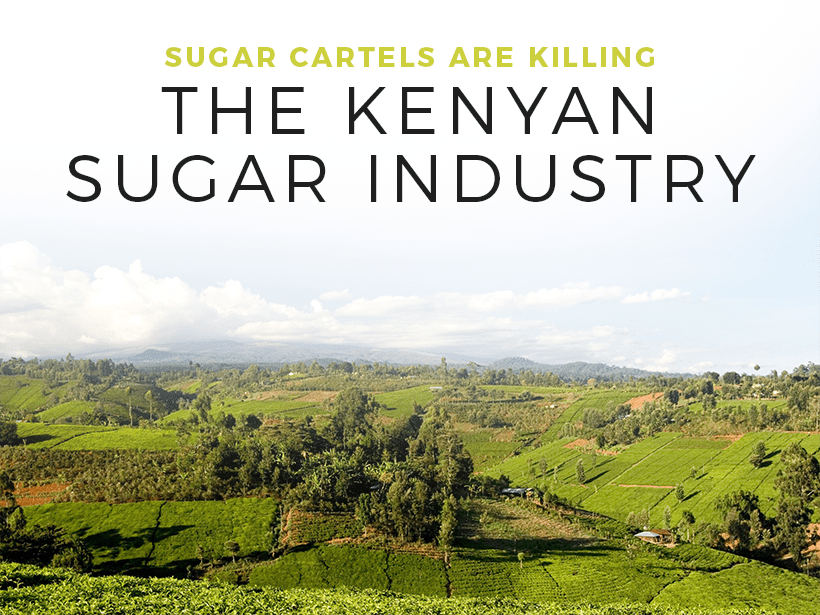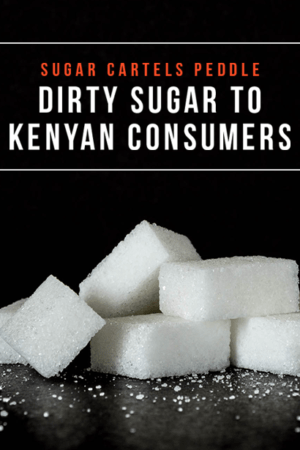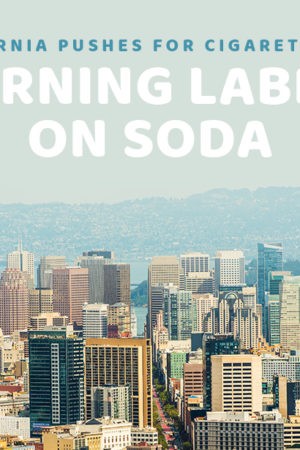As I shared previously, cartels within the Kenyan sugar industry are peddling contaminated sugar to unwitting Kenyan consumers. Unfortunately, contaminated sugar is just one symptom of a severe disease within the country. In reality, powerful sugar cartels are slowly strangling the Kenyan sugar industry, leaving many farmers trapped in poverty.1
Powerful cartels act with impunity
Large cartels work in tandem with government officials to secure their status as profiteers within the Kenyan sugar industry. In fact, reporters speak of “Kenya’s Sugar Daddy,” someone who is able to purchase massive amounts of sugar on the global market. However, they are unwilling to publicly name this person for fear of reprisal—they fear their very lives could be at stake if they were to do so (check out this video2 of four Kenyan reporters discussing their fear to report the truth). Since these powerful figures operate within the framework of the Kenyan government, reporters do not believe their government has the means or even the willingness to protect them. Cartels wield considerable influence and power within the government, changing laws and regulations at will, all while making massive profits from their activities.
Unregulated importation squeezing out Kenyan farmers
Specifically, cartels have destroyed most import protections for Kenyan farmers. Countries use import protections such as duties and tariffs to protect national growers from competition on the global market. Cartels, however, have worked government regulations to allow themselves to import sugar duty-free for a significant portion of the year. Unfettered importation brought a flood of cheap (and sometimes contaminated) sugar into the Kenyan market. Kenyan farmers find themselves unable to compete with this cheap sugar, leaving them with crops they cannot sell. One reporter addressed farmers this way: “Dear smallholder sugar farmers, I have bad news for you: You will never make money out of the crop.”3 Cartels have removed laws protecting farmers and can import sugar duty-free, getting it far below prices local farmers can compete with. As these cartels make more profits off their rigged system, sugar farmers grow more impoverished.
The status quo is protected by cartels and prevents modernization of farming methods
Cartels are not the only problem in this equation–inefficient farming practices are a key reason why Kenyan sugarcane farmers cannot compete in a global market. Countries that rely on large-scale plantations and mechanization lead the global sugar market, while Kenya relies on farmers working on small plots of land. Without the efficiency of a plantation system with many workers operating a single farm, Kenyan farmers cannot hope to compete against countries like Brazil.
Kenya should have modernized its farming practices long ago. Why haven’t they? The answer is simple: “Cartels mushroomed in the chain, taking advantage of the general collapse of the industry…” Simply put, cartels benefit from the status quo. They can import sugar at a price far lower than that produced by Kenyan farmers. Cartels made the rules for their own benefit; why would they change them?
NUTRITIONAL DISCLAIMER
The content on this website should not be taken as medical advice and you should ALWAYS consult with your doctor before starting any diet or exercise program. We provide nutritional data for our recipes as a courtesy to our readers. We use Total Keto Diet app software to calculate the nutrition and we remove fiber and sugar alcohols, like erythritol, from the total carbohydrate count to get to the net carb count, as they do not affect your blood glucose levels. You should independently calculate nutritional information on your own and not rely on our data. The website or content herein is not intended to cure, prevent, diagnose or treat any disease. This website shall not be liable for adverse reactions or any other outcome resulting from the use of recipes or recommendations on the Website or actions you take as a result. Any action you take is strictly at your own risk.
- Keto Might Give Navy SEALs an Advantage - July 18, 2019
- The Primary Roles of Fat in Our Diets - July 8, 2019
- Low Carb Tech is Transforming Diabetes Treatment - June 21, 2019































